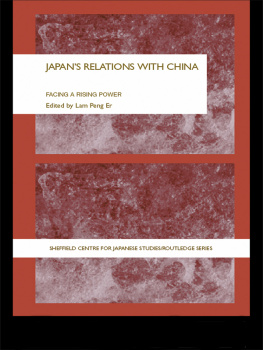A Taste of Freedom:
Memoirs of a Taiwanese Independence Leader
by Peng Ming-min
Foreword
by George H. Kerr
As a small boy Peng Ming-min left the sheltered security of a well-to-do Formosan family to enter a Japanese kindergarten at Taipei. From the outset he was ever-conscious of the contrasts and differences between the world of Formosan Chinese traditions and the world of his Japanese classmates and acquaintances. As a superior student, remaining always a little apart, he advanced steadily through Japans prewar educational system until he approached its summit at the prestigious Tokyo Imperial University. Under the guidance of Japanese teachers, he had discovered along the way something of the best of Japan and much of the best in the Western intellectual heritage and he had become entranced with French literature. As his father pointed out, this was not the most practical field in which a colonial subject might develop a profession, but it was highly characteristic of a dreamy youth clearly out of touch with wartime realities. Nevertheless, his experiences at school in Japan give us a glimpse of student-life during the so-called China Incident and the years of the Pacific War.
On being driven out of Tokyo by the great carpet-bombing fire raids of early 1945, he made his way to Nagasaki where he himself suffered grievous injury during a chance raid before he reached the comparative safety of his brothers home near Nagasaki. From a seaside village some twenty miles distant, he saw the flash of the second atomic bomb dropped on August 9, and watched the awesome mushroom cloud rise above the city to cast its shadow over mankinds future.
French literature ceased to be the central interest in his life. On returning to Formosa in January 1946, the young student found himself at home again but in a changed world. As an intellectual Peng could appreciate Japans past contribution to the life of the island people during the preceding half-century, but as a second-class colonial subject he shared with family and friends the emotional expectation that at last the Formosan Chinese would experience the profound satisfaction of representative government under a rule of law and the self-respect possible only to men who enjoy full citizenship.
THESE GREAT EXPECTATIONS were not realized. Formosa had been delivered into the hands of the continental Chinese by expedient decisions made in Washington during World War II. It was as if Formosa had suddenly retreated to the nineteenth century. The rule of law had ended, and an era of gross exploitation had commenced, leading quickly to the abortive islandwide rebellion of 1947.
Thanks to his indulgent and nonpolitical family the young student was able for a time to remain remarkably aloof from the harsh realities around him and to indulge once more his bookish tastes. He had entered the newly reorganized National Taiwan University at Taipei. We cannot doubt that his experiences in Tokyo and Nagasaki now influenced the development of his intellectual life, and he turned from the pleasures of French culture to a consideration of the legal aspects of air navigation in peace and war. In this he soon made himself a local authority, attracting the attention of his faculty and winning the patronage of the distinguished scholar Dr. Hu Shih. He was sent abroad to study, first in Montreal and then in Paris, thus moving for the first time into a third world. Here he distinguished himself as a pioneer in the new field of space law, his technical publications attracting considerable international attention.
On his second return to the Formosan Chinese world, in 1954, Dr. Peng now a member of the faculty of law in the university found himself obliged to discuss Formosas international legal status privately with his students and to respond publicly to many official demands and attentions. He was soon drawn inadvertently into the swirling factional politics of the Nationalist Chinese leadership. The Generalissimos absurd claim that he and he alone represented China in world affairs, and that his forces were about to recover the mainland dominated the councils of government, party, and army, but intellectuals such as Hu Shih, the scholar-diplomat, and Lei Chen, a distinguished editor and journalist, argued that the situation must be reappraised and that the Nationalist leadership must set about binding up the wounds of 1947 and winning support among the Formosan Chinese people.
To this end they attempted to cultivate and bring forward promising young Formosans prepared to take the place of aging continental Chinese refugees. Dr. Pengs personal experiences in the midst of these crosscurrents at Taipei illustrate the problem. It is ironic, therefore, that Peng Ming-mins ultimate preeminence as a spokesman for the younger generation of well-educated Formosans developed principally because of honors and attentions showered upon him by Nationalist Chinese intellectuals, party leaders, and government agents who sought to make him their man.
The politicization of Dr. Peng under these circumstances becomes a principal theme of this memoir. At Taipei he was brought forward to positions of prestige and authority and again and again was sent abroad to academic conferences at Seattle and Boston, Tokyo and Paris, and at last to join briefly the Chinese delegation to the United Nations General Assembly in New York. His present account gives us glimpses of leading Chinese personalities for example, the Generalissimo and his son and of Taipeis desire to convince the world that the people of Formosa are united in support of Nationalist leadership. In brief, he found himself sailing under false colors.
After his last trip to the United States, he was drawn into dispute with the governing powers and into an act challenging police state authority. The consequences were severe but not surprising. His arrest, trial, release, and irksome life under close surveillance made it clear that his ultimate personal fate rested upon the chancy outcome of policy struggles within the army and party hierarchy. Thanks to his timely escape and return to the West, he was spared the harsh fate that has overtaken so many political prisoners elsewhere in the totalitarian world.
I welcomed the request to collaborate in producing these memoirs. When Dr. Peng was fourteen years old a middle school student I began a period of three years residence in Formosa. Nine years later, as an assistant naval attach representing the United States embassy in China, I was present in Formosa when Peng and his brothers family returned to the island. Later, as a foreign service staff officer at Taipei, I witnessed the uprising of 1947 of which my account (Formosa Betrayed) has been published elsewhere. That abortive rebellion, put down by Chiangs troops with cold ferocity, quite effectively destroyed a generation of Formosan leaders and began the systematic destruction of an emerging conservative Formosan middle class.
Since that event I have watched the island with great interest, noting especially Formosan efforts to agree upon and bring forward a new local leadership despite all the harsh measures of well-entrenched police and military authority. After his arrest in September, 1964, Professor Peng became a symbol of Formosan resistance to the Nationalist Chinese occupying authorities and the articulate spokesman for the Formosan interest.
These are entirely his memoirs. I have acted only as an amanuensis to whom he has dictated his story, drawing him out through questions and comments designed to refresh his memory. The final version of the manuscript is his; were he not such a busy man he could have dispensed entirely with my assistance. To be fair to Dr. Peng, the reader must realize that in his flight from Formosa he had no opportunity to bring away detailed family records, diaries, or notes concerning names, dates, and places with which he might have enriched and sharpened the narrative. It now remains to be seen what Formosas ultimate fate may be and what part he may have to play in it.


